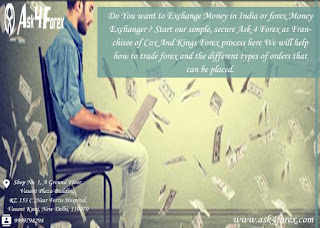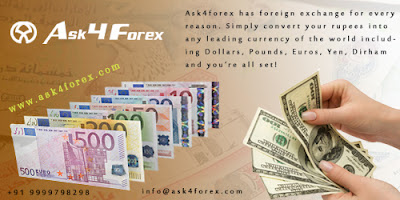Currency Exchanger in Delhi | Foreign money Exchange in Delhi
These days, going abroad to work or for vacation is pretty common. In order to travel out of our country, we need the currency that the destination country uses. So, if you are going to the United States you will need US Dollars if you go to Europe Euros and so on...
What is Foreign Exchange?
Foreign Exchange (forex in short) is the blanket term used to refer to the currencies of countries that are not our own. I am an Indian, so US Dollar, Singapore Dollar, Malaysian Ringets, and UK Pounds etc are all Foreign Exchange for me. Similarly, for citizens of those respective countries, the Indian Rupee is forex.
Purchasing foreign exchange
Foreign exchange can be bought from any authorized dealer, such as banks that deal in foreign currency. Besides these, money changers also provide an exchange for business and private visits. Large banks like ICICI, HDFC, Axis Bank etc have a dedicated Forex department that deals with currency exchanges. If you give them Indian Rupees, they will give you the Forex equivalent to that amount. If the amount you are converting is less than Rs. 50,000/- banks will accept a cash payment. However, if the rupee equivalent exceeds Rs 50,000, the entire payment should be made through a crossed cheque or demand draft.
A point to note here is that, if your company is sending you on an official visit to any foreign country, they will take care of the currency conversion. You do not have to worry about it (Unless you feel, the amount they are giving is too small). For Personal Business Trips or for Vacations, it is our responsibility to get the currency converted ahead of time.
Instruments of Foreign Exchange Market
The instruments, with the help of which the international payments are affected. They are:
Cheques and Bank Drafts: Persons dealing with foreign exchanges can use bank cheques as well as bank drafts in order to make payments. The cheque is drawn on particular bank instead of a person.
Bills of Exchange: It is also called as a foreign bill of exchange which is an unconditional order in writing addressed by one person to another. It mentions the person to whom a certain sum is to be paid either on demand or on a specific date.
Mail Transfer (MT): Under this, funds are transferred from one account of a destination to another destination in the nation by mail. For international payments, air-mail is used.
Telegraphic Transfers (TT): By this method, a sum can be transferred from one place to another place in the world by cable or telex. This is the quickest method of transferring fund from one place to another.
Thus, these are various instruments/methods used for inflecting International payments.
Operation of Foreign Exchange Market
There are thousands of securities traded on a stock market. But in the foreign exchange market, there are only eight currencies in which trade takes place. These are:
• U.S. Dollar ($)
• European Currency Unit (€)
• Japanese Yen (¥)
• British Pound Sterling (£)
• Swiss franc (Sf)
• Canadian Dollar (Can$)
• Australian Dollar
• New Zealand Dollar
Financial Instruments of Foreign Exchange Market
Spot: Spot transaction is a two-day process. It is the fastest transaction in the foreign exchange market. This trade involves a direct exchange between two currencies, has the shortest time span and directly involves cash. The transactions are based on the spot rates i.e. rates existing in the market at the time of the deal.
Forward: The forward contract is another mechanism used in the foreign exchange market. In this type of transaction, the rate is agreed upon by the parties at which the exchange takes place on some future date. The market rate does not play any role in forwarding contracts. The time period of the contract may be one day, one month or one year as agreed upon by both the parties.
Future: Futures are the contracts traded on standardized exchanges with standard contracts and maturity dates. The average time span of futures is 3 months and they involve some interest which is to be paid to exchanges as fees to the contracts.
Swap: Swaps are the contracts wherein the buyer and the seller agree to exchange currencies for a certain time period and reverse the transaction on the maturity date of the contract. These contracts are not standardized and can be traded without exchanges.
Option: Options are the derivatives wherein the owner has the right, but not the obligation, to exchange the currencies at an agreed exchange rate and on a specified future date. These are much similar to forwarding contracts, the difference being that a ‘forward’ puts an obligation on both buyer and seller to perform the contract whereas the ‘options’ give the owner a right which he may, or may not, exercise.
Conclusion:
The foreign exchange market is a place where the major eight currencies of the world are traded through different financial instruments at different types of the rates. This market is the most liquid market in the world which operates 24 hours a day except on weekends. The major participants in the market are banks, firms, and companies, individuals (through brokers), central banks, nonbanking financial institutions, foreign exchange companies, etc. who trade in different financial instruments like options, forward contracts, futures, swaps and spot transactions.



Awesome article! I like it. San Francisco Currency Exchange
ReplyDelete